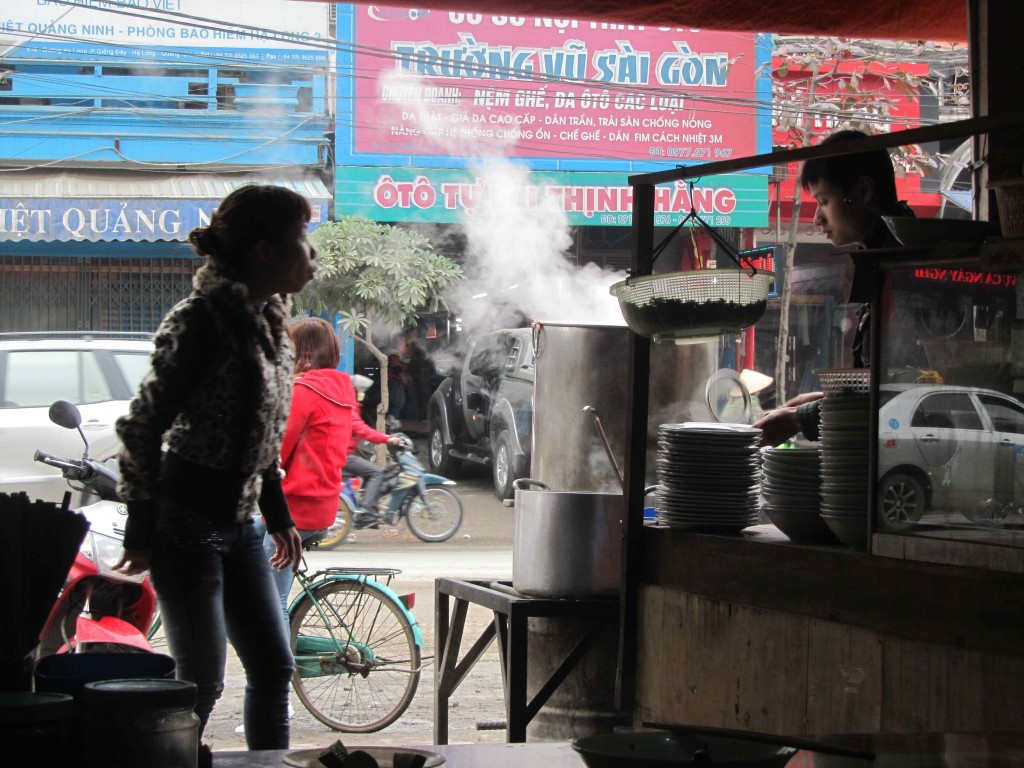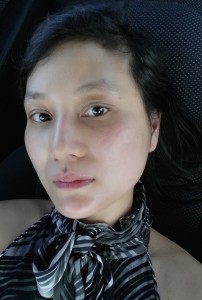Vi Khi Nao’s writing embodies the currents and twists of desire, sensation, perception, language, and space. She is daring in her experimentation, yet very precise, even in the seeming flow and music of her long, grasping lines. We are happy to present this hybrid photo/lyric/essay piece, “When You Let Down Your Hair Christine,” for OUT OF THE MARGINS’ August post. We also highly recommend keeping an eye out for Vi Khi Nao’s forthcoming novel, Fish In Exile, to be published this November by Coffeehouse Press. Please also see Eric Nguyen’s review of Vi Khi Nao’s poetry book, The Old Philosopher (Nightboat Books).

WHEN YOU LET DOWN YOUR HAIR CHRISTINE
Let’s pretend to be grammatically hysterical for a moment Let’s pretend that there are no rules to how we are born or how a sentence comes into the world. The flowers from Whole Foods on my windowsills have desiccated to where touching one petal is like touching a piece of chalk. When the flowers, these purplish things , lean against the glass part of the window I think yes, my one neo-pleonastic chalky pen (that flower) is writing her pseudo-calcium-sulfate thoughts on the pane as she leans as she leans like a historian collecting phantom breaths in the inauditory , vaporous voices of the ancient, inflorescent past – an exhibition of voices – her face an audience absorbing the elevation of my shifting demeanor when my ex wasn’t throwing soup @ me or making me a type of Nam Dinh Phở to go – she would tell me not to be afraid to inspect the world closely & here I am gleaning from her wisdom as one flower head as she rewrites the phantom sentence on glass this isn’t a cantrip a noun This isn’t the highest pollution of desire This is merely a quotidian exercise in existing
More than tilting back, I remember, At night in my Providence apartment while all stones huddle in the corner to cry alone I
imagine this is how women cry, Christine this is how
women cry Into stones, they weep I imagine this is how stones breathe: minerals pull back their
obdurate mantels to allow a century to sink and layer and some how the words get there.
At night in my Providence apartment I contemplate the difference between solitude and loneliness When I think of solitude I think of the evanescent depth of the human mind as a snowy, flexible connective landscape from the ligature between bones cartilage the medical dictionary likes to call it. I think of Solitude as the ontological cartilage that keeps the bones of loneliness and suffocation from rubbing.
When you let down your hair, Christine, my heart is not a bathroom stall that you can flush down the water pipe. I watch a leaf curl. Watch the fever. Watch the delivery of an exhale. So deliberate like prostitution. Sometimes I wish the uterus could defenestrate from the window of womanhood like a cat and land outside of my quasi-feline female body like a black snowstorm.
Sometimes falling in love with a married woman does that to you.
Sometimes when Christine gazes at me all the oars of my ribs lift—
Today I feel sick to my stomach with beauty and aluminum. Aluminum is fragile. It cracks, I wrote. Washing whites in winter is like having a personal snowcapped mountain made of bed sheets and lingerie before one’s very eyes. The view, what a view. Sometimes when I hang clothes outside on the fire escape I wonder if the silk blouse that sits next to the cotton panty blushes. Perhaps it’s not the sun or the wind or the outdoor it’s too much blushing that the garments, large small, petite and sexy , the real reason why they get desiccated French The thing is King David didn’t have to annihilate a life to get Bathsheba he could have exposed his vulnerable Hebrew, the-second-king-of-Israel heart to her and let her decide if she wanted him I mean what are the chances of someone not wanting a king? If Michael Fassbender, hot sexy glorious, knocks on your door and tells you how much he loves and wants you, you drop your shopping cart, your tedious husband , toss your children in some corner of the universe, and ask Fassbender out of 100 rooms which room to sprawl out not your high soprano hummingbird but your eaglized thighs. On a Thanksgiving phone call to my mother, my mother excitedly persuaded me to eat more bell peppers, more kale more Vitamin C more Omega 3 & she asked if I was lonely? & I thought of Ben Luton who once told me he used to hear really well & about saying goodbye to Peter sometimes on Hope Street after walking home as soon as poetry workshop ended. When I think of two tall men walking I wonder if the space between their bodies is a female chronograph stopping silence, time, and stem whose silence is a voiceless voice, her stem trailing off between their tall legs like a winter hyacinth ? Sometimes it’s just economical to throw her in the air, the invisible woman that exists between the space of Ben’s legs and Peter’s . And I remember yes there was so much in the details: Most people just want Starbucks to enter their blood stream but all I want to do is take a nap with Christine
Sometimes when Christine lets down her hair, sometimes when she lets down her hair, it seems as if my nocturnal bloodstream were transporting private cargos of emotion across the pacific. I imagine this cargo as it makes its way out to the mouth of the sea, which is air & exposure. This shipment of emotions. This transportation of goods & delirium. I think of Rilke’s marriage: marriage is protecting each other’s solitude. I used to think of solitude as a member of the nightshade family -dangerous when inhaled mistakenly – I imagine Rilke isn’t thinking of the nightshade family, eggplants & potatoes, or of different bastions in this world: the Berlin Wall or the Wall of China. I imagine that he means the roof of my mouth. I imagine protecting. Christine’s solitude would be the purpose of the roof, a sonic awning that travels and protects the vocal cord of Christine’s existence: allowing her own voice and lunar middle-sphere to breathe and occupy its own space. Rilke’s solitude is Rodin’s formal constraint on clay protecting a beloved’s solitude is protecting the fugitive material that houses the fluidity of her individuality protecting her ontological center as her yet unhewn existence is cast into form I think of Rodin’s form keeping with the form.
When you let down your hair, Christine, it seems at if she let down her Pansori opera house and then I think of how the world is made of Genesis – that the earth is born out of God’s great orgasm an orgasm that expands into a planet and that each orgasm has its own moon orbiting its planets and how the galaxy is one big G-spot And I think the entire cosmos has been trying to make God accountable for her pleasure his delirium Astronauts have been going to the outer field of this orgasm trying to capture God’s solar, intergalactic desire. Perhaps I do not have the solar energy of a man, but my moon can make waves bend their undulating net of motion and sea debris. Perhaps all love is a bit hyperbolic in writing But at the end of a memory bank I imagine Christine a lady bug and I an ant trying to descend together the fiberglass boulder of a wine glass – because the nectar of the quotidian – has minipleasure in every bite as we shoulder to shoulder watch the sunset of an oyster platter flake into a human mouth. And I imagine taking one sliver or lamina of sugar and use it as a makeshift ligament to mend one of your six legs as you may have sprained it on your way down the glass boulder I imagine that we might want to inhale an assembly line of twilight as it gets superimposed over each other over the millions of years and so that I could lean Christine into my arms and ask her which bed – the oyster shell or the lettuce as our conjugal station for tonight and we would gaze at the salad sky with her aligned stars of salt & bread crumbs and close our eyes while the Andromeda of balsamic vinegar watches as we fall asleep my centripetal hand overlapping Christine’s
–

Vi Khi Nao was born in Long Khanh, Vietnam. She holds an MFA in fiction from Brown University. Her work includes poetry, fiction, film and cross-genre collaboration. She is the author of Fish in Exile (Coffee House Press) and was the winner of 2014 Nightboat Poetry Prize and the 2016 Ronald Sukenick Innovative Fiction Contest.
This post is part of diaCRITICS’ Vietnamese American Literary Series, OUT OF THE MARGINS, launched in 2015-16. The series curates literary work from poets, writers and artists of Vietnamese-American and Vietnamese diasporic experience. Our mission is to create an inclusive, diverse, provocative, ongoing space for voices and visions from this community, thus bringing them out of the margins. Dao Strom is the series editor and curator.
Do you enjoy reading diaCRITICS? Then please consider subscribing!
Please take the time to rate this post (above) and share it (below). Ratings for top posts are listed on the sidebar. Sharing (on email, Facebook, etc.) helps spread the word about diaCRITICS. And join the conversation and leave a comment!



Loved reading this article, and I have no idea why I am weeping right now!! Beautiful!
My God indeed… you understand… how is it possible… nobody seems to understand… I salute you…
“…the earth is born out of God’s great orgasm…”